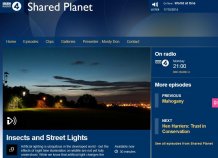Articles

Radio 4's 'Shared Planet' recently discussed artificial light pollution.
The ESI: in demand on the BBC again
ESI researcher Dr Thomas Davies maintained the ESI’s recent representation on the BBC when he was interviewed by Monty Don for Radio 4’s ‘Shared Planet’.
The programme – which not long ago featured the ESI’s Director, Professor Kevin J Gaston – explores the complex interface between a growing human population and wildlife. This episode dealt with, and featured contributions by researchers into, the impacts on different species of artificial light pollution.
Dr Davies was interviewed with reference not so much to its impact on individual species, but to how it might change the way groups of species interact with each other. He stressed that this research – into how light pollution affects invertebrate communities – is still in its infancy, and said conclusions would therefore be hard to make with any certainty until several ongoing large-scale, Europe-wide projects were completed. Dr Davies is part of one such long-term project, ECOLIGHT, which is based in the ESI.
He also emphasised how artificial light is not only a form of pollution just like, for example, noise, but that it’s a much more recent phenomenon than various other human-caused changes. “Because light has remained a constant over the evolutionary history of most species, these are quite rapid changes, on a massive scale, that have been experienced only in the last 50 to 60 years.”
For this reason, he went on: “… ‘light-naïve’ species will currently be experiencing the first impacts of light pollution – changes in how they predate, scavenge, reproduce, navigate and aggregate – and so, although we know light pollution is having profound effects on groups of species, we need to wait for more data until we can describe those effects with certainty, and say what impact they’ll have on ecosystem services as well as on the species themselves.”
You can read more about ECOLIGHT, and ‘Shared Planet’ is available to listen to here.
Date: 17 October 2014
